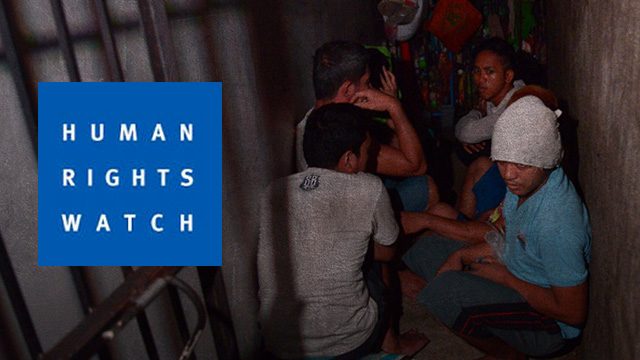SUMMARY
This is AI generated summarization, which may have errors. For context, always refer to the full article.

MANILA, Philippines – International watchdog Human Rights Watch (HRW) on Saturday, April 29, urged the Philippine government to immediately release the 12 men and women allegedly illegally detained in a “secret jail” in Police Station 1 in Tondo, Manila.
They were discovered after a team from the Commission on Human Rights (CHR) made an unannounced jail visit on Thursday, April 27. The “lock-up cell,” which had no electricity and no functioning toilet, was hidden behind a bookshelf.
“These detainees have been wrongfully held and should be freed with adequate protections against police reprisal,” HRW deputy Asia director Phelim Kine said in a statement Saturday.
The human rights group said government must ensure the detainees’ protection after their release.
They also urged the CHR and the National Bureau of Investigation to conduct a joint investigation into the existence of other “unofficial lock-up cells” in police stations nationwide, and see to it that such cells are shut down.
The group cited a 2015 CHR study that suggests unofficial lock-ups are a common feature in police stations in the country.
“The police authorities should be put on notice that responsibility for the detainees’ safety rests with them,” Kine added.
During Thursday’s visit, the CHR team led by Gilbert Boiser of CHR National Capital Region (NCR) wanted to free and take with them the detainees, but the police objected.
Former Station Commander Superintendent Robert Domingo claimed the detainees were locked up as their documents were still being “processed.”
Domingo was relieved from his post Friday, April 28, and will be investigated by the Philippine National Police (PNP) Regional Internal Affairs Services.
In its statement, HRW said the PNP “has long had a horrific record of mistreatment of suspects in custody,” citing one of the high-profile cases in January 2014, when police officers based in Biñan, Laguna were caught running its lock-up cell as a “torture facility.”
The group said police abuses of criminal suspects in detention “is an even greater concern given revelations of deadly police criminality linked to Duterte’s ‘war on drugs.'” (READ: PNP behind extrajudicial killings – int’l rights group)
“Secret jails may just be one more form of police criminality that has multiplied during the drug war,” Kine added.
On Friday, Duterte himself promised to “look into” the secret jail cell.
‘Dark and open secret’
In a statement on Saturday, Senator Risa Hontiveros said the “secret detention cell” in Police Station 1 is unconstitutional and a “throwback to Marcosian times.”
She added that its existence “confirms a dark and open secret.”
“The government’s war on drugs is not based on transparency, civil rights, and rehabilitation. It is abusive and exploitative. It is a war against human dignity and the poor,” she said.
The cell, according to her, violates existing standards and regulations on jail management.
“It is an ideal atmosphere for rape and other forms of sexual abuse as both men and women are detained in the same facility. It also creates the perfect climate for illegal arrests and incarceration, enforced disappearances and torture,” Hontiveros added.
The senator called on the PNP to explain reports that the Manila Police District “surreptitiously closed down the secret detention cell” and that the police “acted in haste in filing formal charges against all who were unjustly incarcerated in that facility.”
“I hope this is not an effort to whitewash the crime and erase evidence of their wrongdoing,” she added.
Manila has been the site of many drug-related killings since the Duterte administration launched its war on drugs on June 30, 2016. (READ: IN NUMBERS: The Philippines’ ‘war on drugs’)
A 10-part investigative story published by Rappler named witnesses who identified Manila policeman Ronald Alvarez as being behind drug-related summary killings in Tondo. (READ: Witnesses name Manila policeman behind drug-related summary killings) – Rappler.com
Add a comment
How does this make you feel?
There are no comments yet. Add your comment to start the conversation.